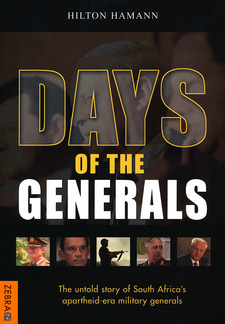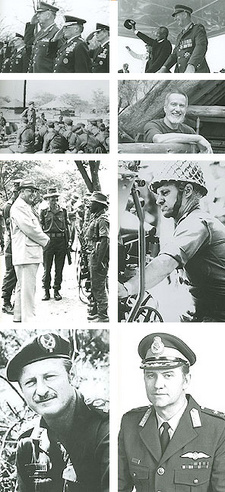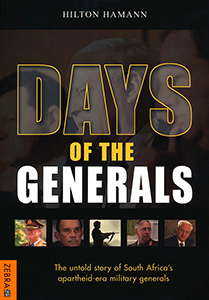Days of the Generals. The untold story of South Africa's apartheid-era military generals, by Hilton Hamann

Days of the Generals. The untold story of South Africa's apartheid-era military generals, by Hilton Hamann. Struik Publishers, Zebra Press. Cape Town, South Africa 2001. ISBN 1868723402 / ISBN 1-86872-340-2 / ISBN 9781868723409 / ISBN 978-1-86872-340-9

Days of the Generals. The untold story of South Africa's apartheid-era military generals, by Hilton Hamann.
Hilton Hamann introduces his book Days of the Generals by describing what has motivated him to do so and outlines that his perspective to him seems to be a untold story of South Africa's military generals that he met as a journalist during the apartheid-era.
The idea for this book came about when my youngest son, after watching a television news broadcast, said to me: 'Dad, when you were in the army, why did you kill all those innocent people?' He'd seen a report about the Truth and Reconciliation Commission and submissions about the activities of the former South African Defence Force. I was flabbergasted. Was his opinion typical of the way future generations would see the SADF and the half-million-plus ordinary men and women of all colours, creeds and persuasions who were part of it? Would we former soldiers be judged on the basis of 30-second television news-bites ... on the reports of journalists who'd never been there and who firmly believed in the motto 'Don't let the facts get in the way of a good story' ... people who more often than not refused to test allegations always seemingly made by unnamed sources? Would history be based on the findings of a Truth and Reconciliation Commission that looked as if it had already made up its mind long before the first submission was made? I suppose it will. That's the nature of wars and political struggles - part of the spoils is that the victors get to rewrite history to suit themselves. But however badly the new historians choose to portray the SADF, I believe that South Africa's new-found democracy and constitution - a constitution held up as a model - would never have been possible without the SADF. In 1975, as a reluctant conscript aged 17, I entered the SADF. Before that year was over I towed a 20 mm anti-aircraft gun deep into Angola as part of the South African conventional forces involved there. A few years later, I was the Sunday Times's military correspondent and also wrote for a number of well-known international magazines and newspapers, notably Soldier of Fortune. I travelled extensively with the SADF, accompanying them into many battles. I spent time with Unita and long periods with the recces and other units. I probably got to see more of the overall picture than anyone in the Defence Force, apart from the generals themselves, and what I didn't see were the atrocities I now so often hear callers telling radio talkshow hosts they committed in the same battles I covered as a newsman. At the time I was paid in US dollars or British pounds for work done for international publications. Just one picture of an SADF member torturing or executing a prisoner or a local would probably have fed my family for a year. I never got to take such a picture because I never saw any of that. The fact is, while many were called up, very few SADF members were ever involved in any sort of battle whatsoever. Probably 95 per cent of all soldiers only ever fired their rifles on a shooting range - something that's tough to admit when all your buddies are impressing the girls with (made-up) war stories. One example springs to mind. The guilty party shall remain anonymous. Years after Operation Savannah I sat in a regimental bar in which a sergeant impressed a bunch of new regimental members with stories of his exploits in Angola. He told them how he'd cut off the finger of a captured prisoner and threaded it onto the chain to which his 'dog tags' were attached - he even had a photograph to prove it. I was a part of that particular gun crew with that sergeant (he was a national serviceman gunner back then), and it is true, he wore a putrefied finger around his neck. [...]
This is an extract from the book: Days of the Generals. The untold story of South Africa's apartheid-era military generals, by Hilton Hamann.
Title: Days of the Generals
Sub title: The untold story of South Africa's apartheid-era military generals
Author: Hilton Hamann
Publisher: Struik Publishers, Zebra Press
Cape Town, South Africa 2001
ISBN 1868723402 / ISBN 1-86872-340-2
ISBN 9781868723409 / ISBN 978-1-86872-340-9
Softcover, 17 x 25 cm, 320 pages, several photos
Hamann, Hilton im Namibiana-Buchangebot
Days of the Generals. The untold story of South Africa's apartheid-era military generals
Days of the Generals is an insider's story of South Africa's apartheid-era military generals.

